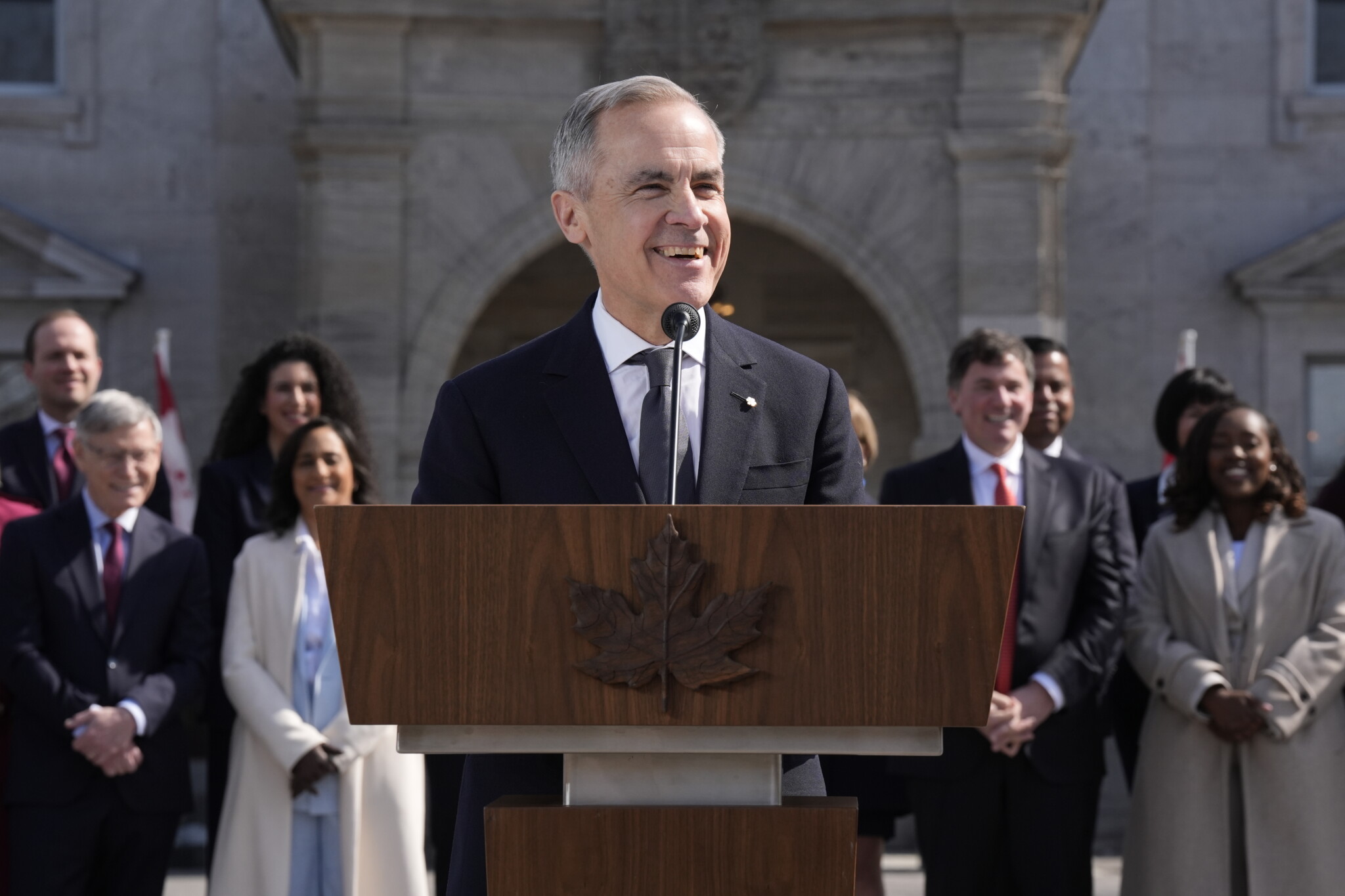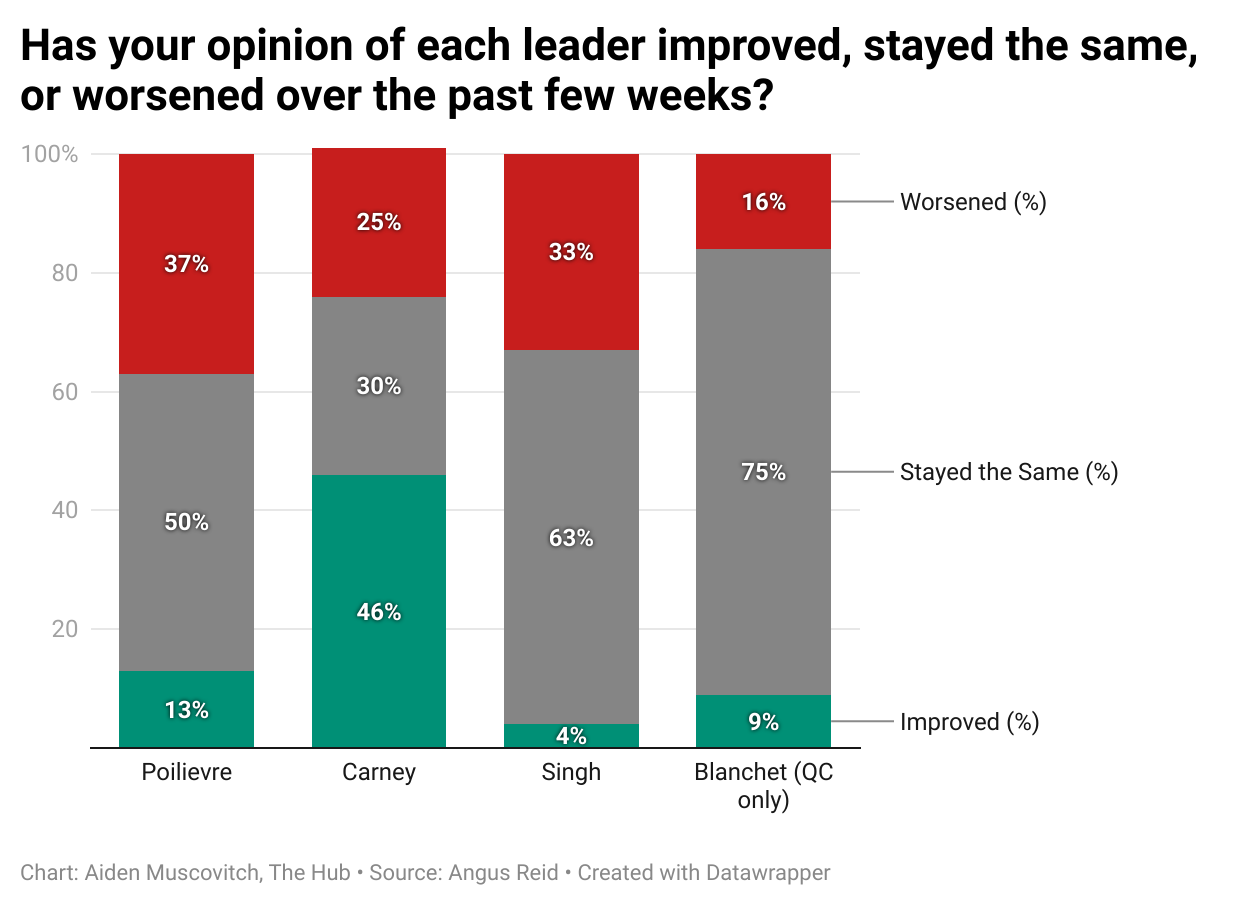This is The Week in Polling, your Saturday dose of interesting numbers from top pollsters in Canada and around the world, curated by The Hub. Here’s what we’re looking at this week.
Carney’s likability improves, Poilievre lags behind
Forty-six percent of Canadians say their opinion of Liberal leader Mark Carney has improved over the past few weeks—including 20 percent of those who voted Conservative in the 2021 election, 56 percent of past NDP voters, and 47 percent of those who supported the Bloc Québécois in the last election.
In comparison, only 13 percent of Canadians report an improved opinion of Conservative leader Pierre Poilievre, 4 percent for NDP leader Jagmeet Singh. Meanwhile, 9 percent of Quebecers say their view of Bloc leader Yves-François Blanchet has improved.
Notably, 37 percent of Canadians say their opinion of Poilievre has worsened over the past few weeks, compared to 25 percent for Carney, and 33 percent for Singh.
In terms of overall favourability, Carney is the only leader viewed favourably by more than half the country. Fifty-five percent of Canadians have a favourable opinion of him, compared to 36 percent who do not view him favourably. Poilievre has had declining favorability for some time. In June of 2024, the Angus Reid Institute reported his favourability at 39 percent. Currently, he is seen favourably by 35 percent and unfavourably by 59 percent.
In January, Singh is viewed favourably by just 33 percent of Canadians, while 58 percent hold an unfavourable opinion of him. In Quebec, 50 percent of residents view Blanchet favourably, compared to 35 percent who view him unfavourably.
Poilievre introduced a few policy proposals this week that may boost his favourability, with both young and older voters.
Focusing in on young voters breaking into the housing market, Poilievre promised a Conservative government would remove the Goods and Services Tax (GST) from all homes under $1.3 million, resulting in up to $65,000 of savings on a new home or $3,000 less in annualized mortgages. Last week, the Carney Liberals announced they would eliminate GST only for first-time homebuyers on homes at or under $1 million.
“This tax cut will save Canadians up to $50,000—allowing more young people and families to enter the housing market and realize the dream of homeownership,” Carney said in his announcement. Current federal rules dictate that new homes under $350,000 are fully eligible for a GST rebate, with a partial rebate available for homes up to $450,000.
Poilievre also committed to keeping the retirement age at 65, breaking the precedent of the last Conservative government, which had it at 67. Poilievre also vowed to allow working seniors to earn up to $34,000 tax-free, an increase of $10,000 from the current level. According to the Conservatives, the measure would save individual seniors $1,300 a year in federal taxes.
The Conservatives win over voters under 55
While older Canadians are gravitating towards the Liberals, younger voters appear to be gravitating towards the Conservatives.
Among voters aged 18–34, the Tories lead with 39 percent support, followed by the Liberals at 37 percent, and the NDP at 11 percent.
In the 35–54 age group, the Conservatives also maintain a lead at 42 percent, with the Liberals at 38 percent and the NDP dropping to 6 percent. However, among voters aged 55 and over, the Liberals dominate with 52 percent support, while the Conservatives fall to 34 percent, and the NDP to just 4 percent.
Young voters have been credited with securing the Liberal Party’s election victories in the past, especially in the 2015 election, which saw then-Liberal leader Justin Trudeau promise to legalize marijuana use. They are still considered a crucial demographic for the Liberals to win over. It could prove detrimental for Carney if the Conservatives maintain their support among Millennial and Gen Z voters.
As a National Post article on this Leger poll contended, the recent uptick in support for Carney is largely by way of seniors. The 2025 election marks one of the first times on record, if not the very first, that younger Canadians show stronger support for the Conservatives than older Canadians. Today, the average 20-year-old Canadian is more likely to vote Conservative than the average 60-year-old Canadian. Nevertheless, youth voter turnout is significantly lower than that of older Canadians. Only 46 percent of voters aged 18-24 took part in the last federal election. They are the least likely demographic to cast their votes.
Earlier this week, The Hub‘s editor at large Sean Speer wrote that the campaign can be defined as an election between young Canadians and old Canadians. He mentioned that the current public opinion in Canada is at risk of causing intergenerational polarization.
“There’s a lot of focus on educational or regional polarization these days. But what does it mean if our politics pits generations against one another, including within families and households?” he wrote.
Younger voters see affordability as the top ballot issue, while older ones see it as Trump
The young
A main contributor to the generational divide in vote intention is determining the ballot box question.
A recent Abacus Data poll found that younger Canadians, between ages 18 to 44, are significantly more concerned about economic issues that directly affect their daily lives, ranking reducing the cost of living and making housing more affordable as the most important factors in deciding which party they cast their vote for.
A recent report from the University of British Columbia argues that Canada’s housing crisis is preventing millions of young Canadians from establishing the kind of living arrangements they desire. In cities like Toronto and Vancouver—where rental prices have climbed steeply—the rate of young people forming independent households has dropped significantly. Instead, many must live with family or share accommodations with roommates to manage expenses.
Financial Post Canada’s latest financial stress index for 2025 showed that personal finances are the leading source of anxiety and stress for 51 percent of Canadians aged 18-34, while less than half of older Canadians feel the same.
Fittingly, young Canadians are looking to the Conservative Party, which has positioned its campaign platform to reduce the cost of living and improve the affordability crisis.
As Speer contended in a recent Hub article, Carney and his Liberal party seem more focused on converging their support among older Canadians, rather than enticing younger Canadians. Speer argues that the Conservatives’ message has resonated with young Canadians disillusioned by skyrocketing housing costs, limited job opportunities, and the intergenerational inequalities arising from COVID-19 era policies. This has led to “an unprecedented spike in Conservative support among those aged 18 to 34,” Speer notes.
The old
In contrast, older Canadians—especially those 60 and over—are far less concerned with housing affordability and cost of living reductions. They are far more focused on broader political issues, with half citing “dealing with Donald Trump” as their top voting factor.
Yesterday morning, Trump and Carney shared their first phone call since the Liberal leader became prime minister. Afterward, the President posted on his Truth Social that it was “an extremely productive call” and that they “agree on many things,” potentially bolstering the already high trust in Carney among Canadians to take on the Trump government.
“[W]e…will be meeting immediately after Canada’s upcoming Election to work on elements of Politics, Business, and all other factors, that will end up being great for both the United States of America and Canada,” he added.
In his post, he called Carney “Prime Minister,” a significant shift away from the insulting “governor” title he frequently attached to Justin Trudeau.
Trump has said in past interviews that he prefers to work with a Liberal government and prime minister rather than a Conservative one. He has called Poilievre “not a MAGA guy.”













